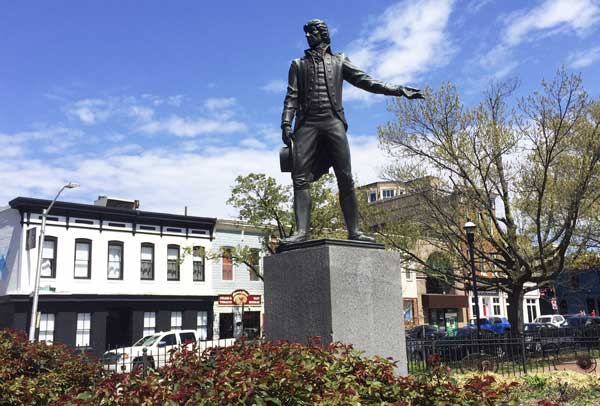A STATUE of a Limerick man who made a fortune while owning slaves in the US city of Baltimore has been taken down, following protests that it celebrates a slaver.
County Limerick native Captain John O’Donnell had a statue erected in his honour in the Canton area of Baltimore, Maryland, on a site where he kept enslaved people to run his plantation and household.
A mariner and merchant, he was one of the first white men to establish trade with China. His plantation, known as The Canton Estate, which was named after the city of Canton in China, became a hub of industry and, in more recent times, the fashionable waterfront neighbourhood known as Canton.
The statue was removed by city authorities on April 5 following a petition and letters from local anti-racism groups.
According to Norman G. Rukert’s “Historic Canton,” Captain John O’Donnell was born in 1749. In his youth, O’Donnell “ran away to sea and found himself in India, amassing a sizeable fortune before he was thirty.”
As an employee of the British East India Company, O’Donnell lived in India for 16 years.
In 1786, O’Donnell purchased 11 acres of land in Baltimore, which eventually grew to more than 1,900 acres. O’Donnell named his plantation Canton, which is what English speakers at the time called the Chinese port city of Guangzhou.
Records show that he kept 36 enslaved people on his plantation.
O’Donnell had seven children with his wife Sarah Chew Elliott. It is believed only one, Elliot, returned to his father’s native Ireland to study at Trinity College Dublin.
Captain John O’Donnell died in October 1805; at the time, he was one of the wealthiest men in the US.
In 1980, the Canton Improvement Association installed the statue in O’Donnell Square Park. An inscription marker at the site described O’Donnell as “a man of great vision and accomplishment.”
In November 2020, the Canton Anti-Racism Alliance, with the support of the Canton Community Association and other members of the community, issued a letter to then Mayor Bernard C. “Jack” Young calling for the immediate removal of the 41-year-old statue.
The letter said in part: “Captain John O’Donnell founded Canton as a plantation in 1786. A statue in his honour was erected in O’Donnell Square Park in 1980. Public records have confirmed that Captain O’Donnell was an enslaver.
“Slavery is morally reprehensible and we, as a community, categorically reject monuments to enslavers.”
The letter also referenced an October 2020 article in the Baltimore Sun written by John Linwood of The Linwood Project who stated: “As a Black homeowner living in Southeast Baltimore, the presence of John O’Donnell’s statue at Canton Square is more offensive to me than any statue of Christopher Columbus.”
Linwood noted how the statue was placed on the same grounds where Captain O’Donnell kept more than 30 enslaved Africans who tended to his livestock and crops, kept his house, and served as waitstaff.
Linwood wrote: “Such nods to the shames of our past have no place in our city and must go if we wish to seek real healing and atonement for our past, and cultivate a Baltimore that welcomes everyone everywhere.”
An online petition was also circulated through the Change.org website that amassed more than 800 signatures over a six month period.
On April 5, the statue was removed, a move that was welcomed by the current Mayor of Baltimore Brandon Scott, who said the statue was a “hostile vestige to the notorious enslaver Captain John O’Donnell.”







